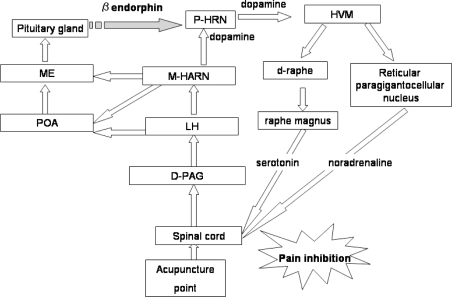Figure 1.
Schematic of the central mechanism of AA. Low-frequency acupuncture stimulation to the acupoint activates AA afferent pathways in the spinal cord, which ascend into dorsal periaqueductal gray (D-PAG), LH and (M-HARN) through the contra-anterolateral tract. Furthermore, the pituitary gland is activated through the POA and ME. Humoral factor(s) (β-endorphin) is released from the pituitary gland. This humoral factor is essential for connection between the afferent and efferent P-HARN pathways for AA. The efferent pathway passes through the (HVM) and divides into two descending pain inhibitory systems in the brain stem. One is a serotonergic pain inhibitory system in the raphe dorsalis and raphe magnus. The other is a noradrenergic pain inhibitory system in reticular paragigantocellular nucleus. Two descending pathways in the DLF block the input of pain sensation in the spinal dorsal horn. [Modified from Takeshige et al. (11–18)].

